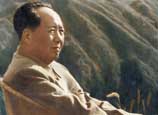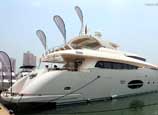
BEIJING, May 12 (Xinhua) -- As the Dow Jones Industrial Average climbed to an all-time high above 15,000 points last week, Zhang, a shoe factory owner in the Chinese city of Wenzhou, yearned to draw money from lackluster domestic markets and invest in U.S. stocks.
But he could not.
Two years ago, when Zhang (his surname) tried to buy a stake in a private American company, he could only get his yuan assets out of China through underground money exchangers.
China only allows a limited number of financial institutions to buy stocks and bonds overseas, as it fears demolishing its currency curb could trigger a capital flight and lead to instability of the financial market in the world's second largest economy.
"But now I see a bit of hope. Ordinary investors finally can anticipate access to diverse options," Zhang said.
China's cabinet pledged on Monday to steadily introduce market-oriented interest rate and exchange rate system reform measures, permitting individual investors to buy foreign equities and mapping out "operational" plans to make the Chinese yuan convertible under the capital acccounts.
"It's not a surprising move. The regulators have been inching towards an opened capital account," said Yao Wei, China economist with Societe Generale. "An opened capital account will make China's financial market more efficient, more transparent, and up to international standards."
Since China's cabinet did not provide a roadmap regarding easing control over the yuan, analysts believed the authorities will deal with the currency cautiously.
The People's Bank of China (PBoC) published a study last year, championing a cautious but forward-looking approach, recognizing that the country had already made significant achievements in liberalizing capital movements while maintaining a stable financial system, and risks for further deregulation are manageable.
"But no one said China would make significant moves this year. Actually this year is not a good time to open the capital account," said Liu Ligang, chief Greater China economist at ANZ Banking Group.
Capital inflows to China have been surging as indicated in recent trade data, and with major central banks pumping cheap money into financial markets, relaxing capital regulation would entice more hot money given big spreads between Chinese and foreign interest rates, according to Liu.
"Freeing capital flow this year will surely cause distortions in financial markets. With the U.S. economy picking up later, the capitals are set to run back to the States," Liu added.
Yu Yongding, a well-respected economist at the Chinese Academy of Social Sciences, a think tank, expressed worries about freeing capital flow as well.
"China should not rush to fully give up capital control," Yu said. "We're in a time of economic and financial uncertainties, and the capital control is a firewall. Though the firewall is leaking, it's better than not having one."

















 New lease on life
New lease on life
Pay tribute to mothers who have been through Wenchuan earthquake


![]()
